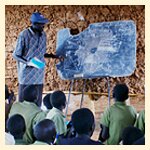The traumatic effects of war, violence, torture or crime may have profound effects on children, youth and their families. Although the role of an educator is not to provide therapy, school staff may have to deal with the behaviours associated with trauma (see Socio-Emotional Supports). It is important to be able to anticipate whether a child might need to be referred for medical or therapeutic services for the treatment of medical conditions, or psychological conditions such as anxiety or post- traumatic stress. Memories of traumatic experiences may persist for years. Children may have experienced:

- A parent or close relative’s death – Exposure to the violent death of someone close, especially if the child witnesses the death can cause severe stress and depressive reactions in the child.
- Exposure to combat – The effects of violence (the destruction of homes or huts destroyed, civilians killed or injured parents seeking refuge) may increase the child’s anxiety levels. Children can develop phobias or other fearful reactions.
- Having to live as a refugee – Having unanticipated and forced displacement can cause students to become very vulnerable and insecure. They can develop phobias, psychosomatic conditions and sleeping problems. Some children become nostalgic and need to mourn their old homes; others reject their new homes and become aggressive or disruptive.
- Long-term separation from parents or primary care givers – Families become separated while fleeing. Parents are kidnapped or imprisoned. It may take years to reunite families.
- Exposure to violence as a witness – Viewing violent acts can leave children with intense feelings of fear, mistrust and anger.
- Exposure to violence as a victim – Children can be victims of war themselves – they can be kidnapped, arrested, detained or tortured.
- Sexual assault – Systematic rape is often used as a weapon of war. Enforced prostitution may also occur.
- Suffering physical injuries – Children exposed to war may have to deal with amputations, serious burns or loss of hearing. These children require a multitude of services such as physiotherapy, rehabilitation and vocational training in addition to psychological interventions.
- Participation in armed forces – Some children are forced to participate in combat directly. This can sometimes be combined with indoctrination programmes that glorify violence. These children sometimes exhibit feelings of revenge and aggression.
- War-caused poverty – Severe deprivation such as limited access to food or water may negatively impact children’s development. There is documentation of the relationship between chronic malnourishment and psychological distress in children.



